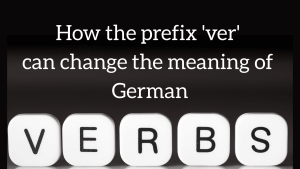
If you are a regular reader of my blog you will have read posts about verbs and how different prefixes change the meaning of the original verb. You might have read
- Exploring the German verb GREIFEN and its variations
- Exploring the German verb BRECHEN and its variations
- Exploring the German verb LEGEN and its variations
- Exploring the German verb STELLEN and its variations
- Are you listening? The German verb HÖREN & 20 different prefixes
Today’s post is a little different as I have a list of verbs that change their meanings by adding the prefix ‘ver’.
All those ‘ver’ verbs are inseparable and when you need the past participle, you need to know the past participle of the original verb and then just add ‘ver’, but no ‘ge’. To make it easy for you, I have added the past participle in brackets after each verb.
- ändern (geändert) – to change
verändern (verändert) – to alter - bringen (gebracht) – to bring
verbringen (verbracht) – to spend time - dienen (gedient) – to serve
verdienen (verdient) – to earn - fahren (gefahren) – to drive
verfahren (verfahren) – to drive the wrong way - fallen (gefallen) – to fall
verfallen (verfallen) – to decay, expire - führen (geführt) – to lead
verführen (verführen) – to seduce - geben (gegeben) – to give
vergeben (vergeben) – to forgive (also ‘to give away’) - gehen (gegangen) – to go
vergehen (vergangen) – to decay - hören (gehört) – to listen, hear
verhören (verhört) – to interrogate/ mishear - jubeln (gejubelt) – to cheer
verjubeln (verjubelt) – to squander (money) - kaufen (gekauft) – to buy
verkaufen (verkauft) – to sell - lassen (gelassen) – to let (somebody do something)
verlassen (verlassen) – to leave (somebody) - legen (gelegt) – to lay, place
verlegen (verlegt) – misplace/ transfer - lieben (geliebt) – to love
verlieben (verliebt) – to fall in love - meiden (gemieden) – to avoid (somebody or something)
vermeiden (vermieden) – to avoid (doing something) - raten (geraten) – to guess, advise
verraten (verraten) – to betray somebody - rechnen (gerechnet) – to calculate, estimate
verrechnen (verrechnet) – to miscount, miscalculate - recken (gereckt) – to strain, draw sth out
verrecken (verreckt), colloquial – to kick the bucket - schieben (geschoben) – to push
verschieben (verschoben) – to delay/ shift - schreiben (geschrieben) – to write
verschreiben (verschrieben) – make a typo/ prescribe a recipe - sprechen (gesprochen) – to speak
versprechen (versprochen) – to promise/ misspeak - stehen (gestanden) – to stand
verstehen (verstanden) – to understand - stellen (gestellt) – tp place, put
verstellen (verstellt) – to move/ alter something - tun (getan) – to do
vertun (vertan) – to do something accidently wrong, waste, squander
There you have it, quite a list of verbs that can be used with or without the prefix ‘ver’, depending on what you want to say. There may even be more, I’ve probably missed some.
But what can you do with these words to remember them?
You can bookmark this post or make a vocabulary list with them. You can do that with any paper or electronic notebook. Or you could buy my notebook which I designed specially for German vocab learners. It has space for vocabulary lists and sentences – very important for these verbs as they change their meaning depending on the sentence! You can even choose one of two colours 😉😉
These are affiliate links to Amazon. It means I’ll get a few pence if you buy anything – at no extra cost to you.

And if you want to know about German verb conjugation in the present or past tenses, check out my online courses. (Use coupon code BLOGPOST to get 10% off)
German tenses 1 – the present tense
German tenses 2 – the past tenses

